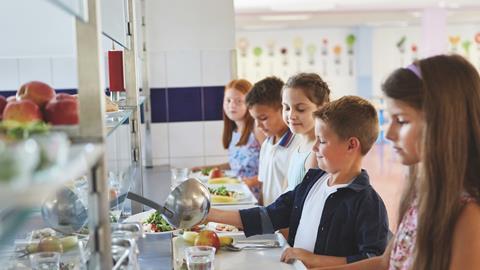Follow the Carrot report says free school meal expansion brings vast potential for fresh produce suppliers
There is a £600 million boost potential for British farming and children’s health, new research has indicated – but it comes with a warning that the government risks missing the opportunity.
With 12 months to go until all children in households receiving Universal Credit in England become eligible for free school meals – benefitting an estimated 620,000 more kids in the first year – new analysis suggests the policy could transform not only children’s health and education, but also Britain’s food and farming economy.
The report, entitled Follow the Carrot, has been published today (9 September) by Sustain, Bremner & Co and the Ampney Brook Foundation, with support from Impact on Urban Health.
It calls on the government to expand school meals in a way that also delivers for British farmers, sustainable food systems and children’s futures.
‘Game-changer for kids and farmers’
The report reveals that expanding to universal school meals could be a game-changer for both children and British farming, increasing the number of meals served each year from one billion to a massive 1.54bn.
Ahead of the NFU’s Back British Farmers Day on 10 September, this surge in demand has the potential to unlock a massive £600mn boost for UK agriculture by sourcing more carrots, broccoli, potatoes and other ingredients from British growers, the report says, while helping the government meet its own target of 50 per cent local, sustainable and British produce in public sector food.
Investing in school meals is a win-win for children, farmers, and the economy, the authors claim. With the potential to deliver 1,540 lorry-loads of carrots (boosting annual sales from £11mn to £18mn), 7.8mn sacks of potatoes (increasing sales from £155mn to £250mn), and 1.3bn florets of broccoli to children (worth £68mn, up from £42mn), the research claims that, with the right support and incentives, healthier school meals can boost both the sustainability and economic viability of British farming.
Barbara Crowther, children’s food campaign manager at Sustain, who commissioned the research, explained: “We’re on the brink of the most important expansion of school meals in a generation. Our report shows we have a really exciting opportunity to use this to deliver a triple whammy of delicious, nutritious meals for children, investment in sustainable British farming and benefits to our wider economy. The government simply cannot afford to miss it.”
Warnings of missed opportunity
The report’s authors caution that this golden opportunity will be lost without decisive government action, stressing that real impact depends on proper funding for school meals, investment in local supply chains and procurement infrastructure, and stronger support for catering teams to deliver higher-quality food.
To secure these benefits, the report sets out five key recommendations for government:
- Unlock growth for UK producers by continuing expansion towards universal school meals.
- Fund school meals properly to reflect the true cost of quality and invest in supply chain infrastructure.
- Raise standards and enforce compliance to ensure nutritious, sustainable food in every school.
- Scale up proven local models that deliver benefits for both children and farmers.
- Join up strategies across health, farming and the economy to maximise the impact of public food spending.
The report’s co-author Myles Bremner, former director of the School Food Plan, said: “The government has set a great ambition of getting more British veg in our schools – a real win-win-win for our farmers and growers, for our kids’ health, and for sustainability. But we need to make sure the school food system is resilient and able to cope with more fresh produce in our kitchens. That means proper kitchens, well-trained staff, and appropriate funding.”
Henry Dimbleby, author of the School Food Plan and the National Food Strategy, also welcomed the report: “If we are to shift the national diet to include more veg and beans, school kitchens are the place to begin,” he said. ”Expand free school meals and buy well; we’ll nourish children, normalise better diets and support British producers.”
British chef, food writer, and broadcaster Hugh Fearnley-Whittingstall added: “This is a golden opportunity to nourish our children with good, wholesome British food while giving our farmers the boost they desperately need. Expanding free school meals isn’t just about filling plates, it’s about filling them with fresh, sustainable, home-grown produce that supports children’s health and strengthens our farming economy.
“With the right investment and leadership, we can turn 540mn extra school meals into a win-win for kids, farmers and the planet.”




